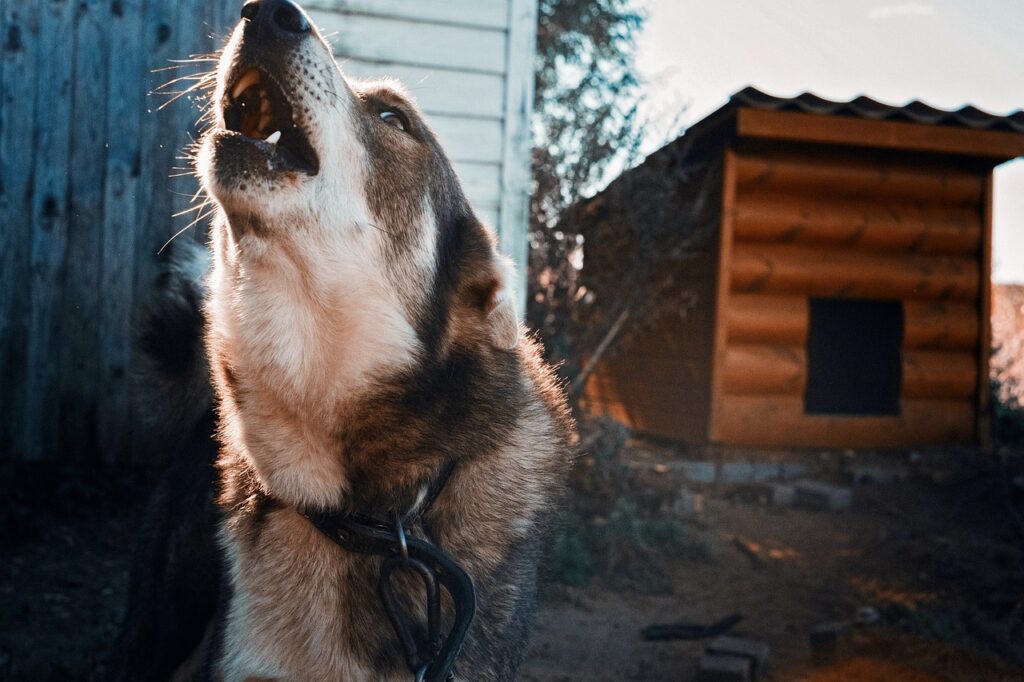Ah, the tranquil canvas of the night, frequently punctuated by the captivating, sometimes haunting, howls of our canine companions. It might send a shiver down your spine or even stir a bit of poetic whimsy in your soul. But have you ever paused and wondered, why do these night-time serenades occur in the first place? In this intriguing journey, we’re about to unfold the mysteries behind dogs howling at night. So brace yourself, for we’re about to embark on a moonlit adventure into the world of dogs and their nocturnal vocalizations.
A Legacy of Their Wild Ancestors
Let’s journey back in time, shall we? Picture this: A pack of wolves in the moonlit night, howling in harmony. This vivid imagery is not just a fragment of the wild, but a testament to the ancient lineage of our domestic dogs.
- Connection to the Wild: Dogs, being descendants of wolves, inherently retain some behavioral traits, including the propensity to howl, predominantly during the night.
- Pack Communication: In the wild, howling serves as a vital communication tool within the pack, a practice that seems to echo even in the domesticated descendants.
The Science of Acoustics and Night-Time Howling
Isn’t it fascinating how the cloak of night seems to amplify these canine choruses? But why is that?
- Acoustic Properties: Scientifically speaking, the calm of the night aids in the propagation of sound waves more efficiently, allowing the howls to carry farther.
- Heightened Sensory Perception: Dogs possess a heightened sense of hearing. The nocturnal stillness provides a pristine platform for their vocal expressions to be heard distinctly.
Territorial Declarations
Could these howls be an invisible fence that demarcates territories, a beacon of sovereignty perhaps?
- Marking Territory: Through howling, dogs might be marking their territory, warning potential intruders to stay away.
- Asserting Presence: This nocturnal vocalization also serves as a tool to assert their presence, broadcasting their existence in a particular territory.
Response to Environmental Triggers
Ah, the night, a time when the world dresses in tranquility, but not for our dogs who seem to have a heightened response to environmental cues.
- Sensory Stimulation: Dogs can be stirred to howl by a range of environmental triggers, from the distant wail of a siren to the soft hoot of a night owl.
- Response to Moonlight: While largely anecdotal, some theories propose that the glow of the moon might stir a primordial urge in dogs to howl.
An Expression of Loneliness
But could there be a tinge of melancholy woven into these nocturnal harmonies? Could the howls echo the solitude that engulfs them in the dark?
- Seeking Companionship: Dogs are social creatures. Howling can sometimes be a vocal expression of loneliness, a call seeking companionship and comfort.
- Separation Anxiety: For some dogs, the night might amplify their separation anxiety, with howling being an outlet to express their distress.
Tips to Address Night-time Howling
The nightly howls, while intriguing, might sometimes disrupt the serenity of the night. So, how can we address this?
- Creating a Comfortable Sleeping Environment: Ensure that your dog has a comfortable and secure sleeping environment to reduce anxiety-induced howling.
- Addressing Health Issues: Sometimes, howling might indicate underlying health issues. Always consult with a vet if the howling is accompanied by signs of discomfort or illness.
Conclusion: A Symphony of the Night
Thus, as we stand on the cusp of dawn, it becomes clear that the nocturnal howling of dogs is not just a mere act of vocalization but a complex tapestry woven with threads of ancestry, environmental responses, and emotions. It’s a symphony of the night, echoing the whispers of the wild intertwined with the contemporary narratives of our domestic companions.
Key Takeaways
- The nocturnal howling of dogs is a rich blend of ancestral traits, territorial markers, and responses to environmental triggers.
- Understanding the multifaceted reasons behind the howls can foster a deeper connection between humans and their canine companions.
- Addressing the triggers of night-time howling effectively can ensure a peaceful night’s sleep for both you and your furry friend.
FAQs
Are all dog breeds prone to night-time howling?
Not necessarily. The propensity to howl can vary between breeds, with some being more vocal compared to others. Understanding the specific traits of your dog’s breed can offer insights into their howling behaviors.
Can training help in reducing night-time howling?
Absolutely. Training and socialization can play a pivotal role in managing and reducing instances of nocturnal howling, especially if it’s triggered by anxiety or environmental stimuli.
Further Reading
For those intrigued and keen to delve deeper, we recommend the following reads:
- How to Speak Dog: Mastering the Art of Dog-Human Communication by Stanley Coren
- The Inner Life of Animals: Love, Grief, and Compassion—Surprising Observations of a Hidden World by Peter Wohlleben
Here’s to embracing the night-time symphonies of our dogs, a melodious testament to the profound and complex world of these wonderful beings. Happy listening!



